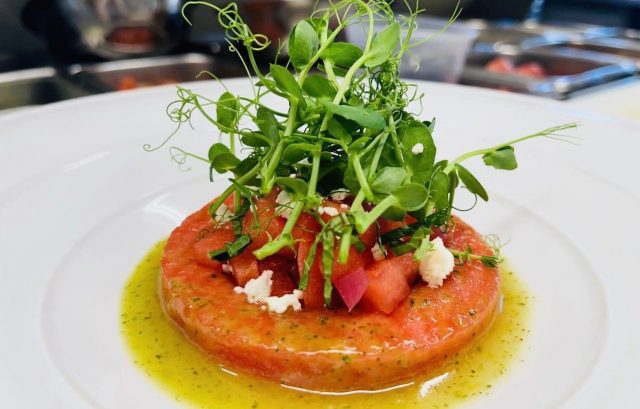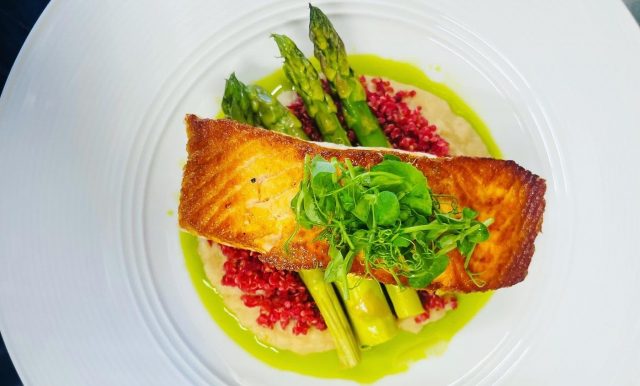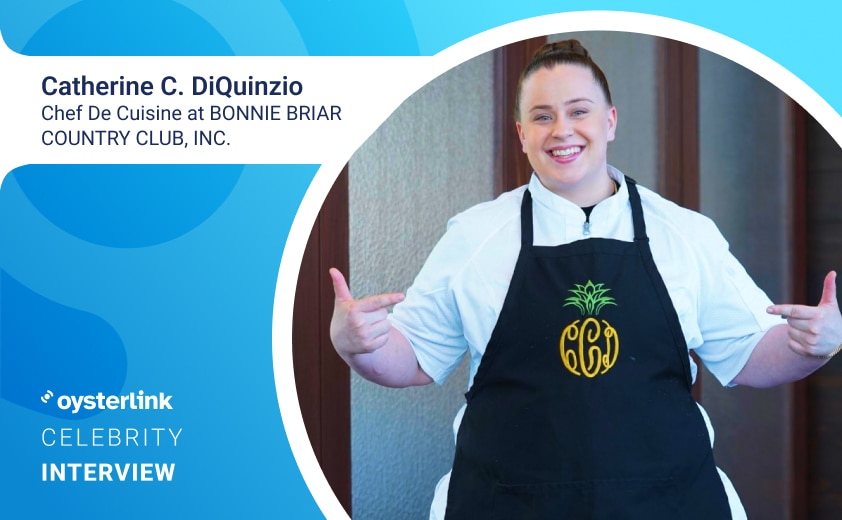Ever dream of turning your passion for food into a fulfilling career? Then buckle up, aspiring chefs, because today we’re diving into the inspiring world of Chef Catherine DiQuinzio, also known as Cat, the chef de cuisine at Bonnie Briar Country Club. Her culinary adventure began unexpectedly in high school, fueled by a fun elective and the keen eye of her instructor, Chef Gerard Murphy. Recognizing her potential, Chef Murphy instilled in Cat the discipline and work ethic that would become the foundation of her remarkable career.
From conquering the snack bar at The Apawamis Club to thriving under the mentorship of Executive Chef Christopher Reveron, Cat’s dedication and passion have taken her on an incredible culinary journey. Get ready to be inspired, gain practical advice, and peek into the exciting world of professional kitchens! In this interview, we’ll explore Chef Cat’s unique journey, highlight the essential skills and qualities for aspiring chefs, discuss the power of mentorship and networking, and learn her secrets for navigating the fast-paced world of professional kitchens.
What inspired you to pursue a career in the culinary world, and how did you get started?
Chef Catherine: I took culinary arts as a trade in high school, a class clown who didn’t take it seriously. However, the chef instructor, Gerry Murphy, saw something in me I didn’t. He taught me about the consequences of my actions, forcing me to reevaluate my approach. I started taking the class seriously and found myself enjoying it. Chef Murphy then set up an interview for me at The Apawamis Club for a summer job in the snack bar. Chef Joseph Napolitano hired me for the season, and I was excited to have my first job in a country club. As the season ended, I loved the fast-paced atmosphere and asked Chef Joe if he had space for me full-time in the kitchen. He somehow managed to fit me in. I worked weekends and some days after high school, shadowing every chef and working weekends as a Garde Manager. When Chef Joe left, Christopher Reveron, the executive sous chef, was promoted to Executive Chef.
Chris took me under his wing and mentored me to the position of sous chef. I am now his chef de cuisine.

How important is professional education for a culinary career?
Chef Catherine: A college education isn’t a requirement in this industry, as we can always learn the necessary skills.
However, attending college taught me invaluable life lessons I wouldn’t have learned otherwise. It challenged me to think critically, instilled persistence and nurtured my self-belief.
It pushed me beyond my perceived limitations and equipped me with the confidence I needed, taking me to places I hadn’t realized I could reach.
Do you have any advice on how to get the first job as a chef?
Chef Catherine: Work through the ranks of the kitchen.
Get your feet wet. Understand how the kitchen operates. Learn from your peers.
Read books, watch documentaries, research cooking trends, and don’t be afraid to take risks and ask questions. The kitchen is a place to be creative. That’s how we create new recipes.

In your opinion, what are the essential skills and qualities that aspiring chefs should focus on developing?
Chef Catherine: We can always learn the necessary cooking skills.
Aspiring chefs should work on life skills like time management, organization, punctuality, research, networking, teamwork, creativity, accountability, public speaking and communication.
These are the important aspects needed for personal growth. Take advice from everyone, listen, pick and choose wisely, and use it to your advantage. For example, while learning a recipe from a chef, jot it down in a notebook, refer to it later, and then add your personal touch based on your taste buds.
How do you handle the pressure and stress that come with working in a fast-paced kitchen environment?
Chef Catherine: It’s simple: find a healthy balance, embrace self-care, create boundaries, and control your emotions. Organization is crucial for any team’s success. Create a game plan and foster a healthy work culture to achieve goals as a team. Lastly, RESPECT everyone and treat each other with the same courtesy you expect.
Can you share your thoughts on the importance of networking & mentorship within the culinary community?
Chef Catherine: Choose your mentor wisely.
They should be someone you respect and look up to, as they can help develop life skills, confidence, knowledge, and expertise and guide you toward your goals.
My mentor has guided me in both my personal and professional life. He encourages me by saying, “I see so much of me in you,” and fosters my creativity by allowing me to express myself in ways I never imagined. His approach is unique; he fosters a respectful environment by avoiding swearing and emphasizing positive reinforcement. I’ve adopted these values, carrying on his legacy with pride. Yes, a mentor is crucial for career success. When it comes to networking, I use LinkedIn to showcase our team’s work, connect with others, and learn about their endeavors.
What would you suggest as the best method to find a mentor?
Chef Catherine: Networking can lead to potential mentors. Write down your needs and create a checklist to guide your selection. Seek a mentor who positively influences your life, shares your values, has achieved target goals similar to yours, and has differing perspectives to challenge you. Suitable mentors include your boss, family members, close friends, or even industry peers
Can you recommend essential resources, for chefs looking to expand their knowledge and skills?
Chef Catherine: I always push LinkedIn because it’s a professional platform that offers excellent networking opportunities, staying current with trends, sharing and receiving job-related advice, seeing and participating in the latest culinary trends and activities, and simply building your reputation. Consider taking some management courses through local federations or groups in the area.
What final piece of advice would you give to young chefs and job seekers in the restaurant industry?
Chef Catherine: Aspiring chefs must develop a strong foundation, challenge themselves, build a robust network, maintain a strong work ethic, and embrace innovation and creativity to succeed in the culinary industry.
Chef Cat’s journey is an example of success for everyone else in the industry. If you’re feeling inspired to embark on your culinary adventure, we’ve got some exciting resources to help you get started! Hear from industry experts Chef JJ, cookbook author Jennifer Clair, and bartending legend Paula Lukas. With dedication and a thirst for knowledge, you can carve your path into the exciting world of culinary arts. Just like Chef Catherine DiQuinzio, your journey begins with a single step. So, what are you waiting for? Start exploring, learning, and cooking your way to success!
About Bonnie Briar Country Club
Bonnie Briar Country Club is a classic club with a rich heritage and a 21st-century atmosphere of a friendly, relaxed fun, and welcoming community. They offer a classic, beautifully renovated Tillinghast/Emmet golf course, first-class tennis and pool facilities, a newly renovated clubhouse, and creative and fun dining options developed by their new chef and his team, and all this is just 30 minutes from Manhattan.




